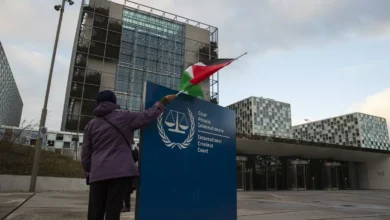The Trump – UAE AI Chip Scandal: Unraveling What May Be the Biggest Corruption Case in U.S. History

In what could potentially become the most significant corruption scandal in the history of the United States, a series of high-stakes financial and geopolitical deals between the United Arab Emirates (UAE) and the Trump circle has raised deep concerns about national security, influence peddling, and the misuse of executive power. At the center of the storm are two high-value transactions that occurred in proximity: a multibillion-dollar investment from the UAE into a Trump-affiliated crypto firm, and a consequential approval for the sale of highly sensitive artificial intelligence (AI) microchips to Abu Dhabi—chips that were previously barred due to national security risks.
According to well-placed sources who spoke exclusively to Dark Box, the events unfolded with astonishing speed and precision. Mere weeks after Donald Trump reclaimed the presidency, the UAE funneled two billion dollars into World Liberty Financial, a cryptocurrency venture co-owned by the Trump family and their close allies. The investment was made using the firm’s proprietary stablecoin, USD1, and backed by MGX—a financial entity chaired by Sheikh Tahnoon bin Zayed Al Nahyan, a senior member of Abu Dhabi’s royal family and a longtime power broker in the Gulf.
Almost simultaneously, the Trump administration reversed previous restrictions on the sale of advanced AI chips to the UAE. These restrictions, originally enforced during the Biden presidency, were imposed out of fear that the chips could be repurposed or leaked to adversarial nations, most notably China. Under the new agreement approved by Trump’s team, Abu Dhabi would gain unfettered access to the technology, with the vast majority of these chips slated for G42, a UAE-based AI and cloud computing firm also chaired by Sheikh Tahnoon.
Insiders with access to internal correspondence allege that the two deals were not only interconnected but deliberately synchronized to appear legally distinct while serving a mutual objective: enriching the Trump family and providing the UAE with critical technological leverage. The proximity of the deals, coupled with the overlapping individuals who facilitated them, “pushes the outer bounds of legality,” according to legal analysts familiar with federal ethics statutes.
Adding to the controversy is Steve Witkoff, a prominent Trump ally and real estate developer who was quietly appointed as Trump’s special envoy to the Middle East after the 2024 election. Witkoff’s son, Zach, was listed as a co-founder of World Liberty Financial. Sources reveal that both men played pivotal roles in negotiating the $2 billion investment and the chip transfer—despite clear conflict-of-interest guidelines prohibiting such activities for federal officials.
The implications extend far beyond ethics violations. AI chips of the caliber sold to the UAE are central to developing next-generation defense systems, including autonomous drones, facial recognition, and quantum encryption technologies. Intelligence officials worry that Abu Dhabi could share this hardware—or the insights gleaned from its application—with Chinese military contractors or strategic rivals of the United States. The Biden administration had previously flagged this exact concern when blocking earlier chip deals.
The crux of the scandal is the circumvention of national security safeguards for apparent personal gain. While public statements from those involved deny any quid pro quo, the chain of events presents a deeply troubling picture. The Trump administration’s greenlighting of AI chip sales—soon after securing billions in funding from the very same regime—suggests a broader agenda of transactional diplomacy and private enrichment.
Beyond the corridors of Washington, this scandal also casts a long shadow over Alberta’s recent engagement with the UAE. Danielle Smith, Premier of Alberta, recently announced a new trade office in the Gulf nation, following meetings with UAE officials over energy and AI collaboration. Critics are now demanding full transparency over the nature of those talks, questioning whether Canadian resources and data could be vulnerable in similar opaque deals.
What makes this case unprecedented is not only the magnitude of the money involved or the sensitive nature of the technology, but the fact that it intersects multiple spheres of influence—economic, political, military, and digital. The AI chips sold under this agreement could shape the global balance of power for decades to come, and their dissemination outside the control of democratic oversight is raising alarms among technologists and diplomats alike.
This unfolding saga underscores the urgent need for robust oversight of both emerging technologies and the financial channels that enable geopolitical manipulation. It also lays bare how easily foreign powers like the UAE can exploit loopholes in American governance to their advantage—particularly when working with a U.S. administration more interested in personal gain than national interest.
As investigations deepen, questions remain: What other undisclosed deals are being struck behind closed doors? How far will foreign governments go to buy influence in Washington? And most critically—how can the U.S. protect its technological edge and democratic integrity in the face of this new breed of transnational corruption?




